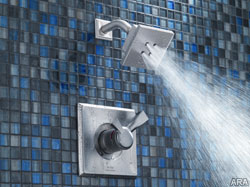
(ARA) – The summer months are right around the corner, and water conservation will undoubtedly be brought to the forefront for those who are impacted by seasonal droughts and water usage restrictions in their towns.
According to the Environmental Protection Agency (EPA), at least 36 states anticipate local, regional or statewide water shortages by 2013, even under non-drought conditions.
“The reality is that water conservation is a responsibility that we all share, regardless of location,” says Carol Anne Kemper, product manager, Delta Faucet Company. “By making small changes around the house and to our daily routines, we can make a significant impact on our water supplies without feeling as though we’re sacrificing our comforts or experience.”
She suggests starting with the home bathroom, where the water-saving potential is great. “The EPA estimates that Americans use roughly 3.3 billion gallons of water each day just for showering,” says Kemper. “We can bring that number down by taking a slightly shorter shower or using a water-saving showerhead.”
It seems to be abundant, but water is a relatively scarce resource. Less than 1 percent of the world’s fresh water is readily accessible for direct human use. Here are a few tips that you can follow to reduce your water consumption in the bath:
* Install a water-efficient showerhead. By installing a water-efficient showerhead, the average four-person household can potentially save an estimated 11,000 gallons of water per year. Here’s an example:
8-minute shower x 2.5 gallons per minute (standard showerhead) = 20 gallons used per shower.
8-minute shower x 1.5 gpm (water-efficient showerhead) = 12 gallons used per shower.
8-gallon savings x 4 people per day x 365 days yields approximately 11,680 gallons of water savings per four-person household, per year.
* Fix a leaky faucet. According to the EPA, a leaky faucet dripping at the rate of one drip per second can waste more than 3,000 gallons per year.
* Learn to reuse and recycle. Don’t pour water down the drain when there may be another use for it, such as watering plants or cleaning.
* Turn off the water. According to the EPA, a bathroom faucet usually runs at 2 gallons of water per minute. By turning off the water while brushing your teeth or shaving, you can save more than 200 gallons of water per month.
* Take showers instead of baths. The average bathtub can hold up to 70 gallons of water when full. By taking an 8-minute shower instead of a bath, each person can save approximately 50 gallons of water per day.
* Switch to a high-efficiency toilet. A high-efficiency toilet uses less than 1.3 gallons per flush, leading to an average of 20 percent less water per flush when compared to the industry standard of 1.6 gallons.
For those who want to conserve water in the bath but are concerned about sacrificing their desired shower experience, Delta Faucet offers its award-winning, exclusive H2Okinetic technology that blankets the body while using less water. The technology manages droplet size, velocity, spray coverage and thermal dynamics, which results in larger water droplets that retain heat longer. The combination of the massaging effect and a denser spray pattern creates a drenching coverage that delivers a satisfying shower at a 1.5 gpm flow rate at 60 pounds per square inch (psi), resulting in water savings of approximately 36 percent.
In conjunction with manufacturers, leading organizations are also taking on water conservation as a serious issue. In March 2010, the EPA established its WaterSense specifications for showerheads to promote water efficiency in the shower, and product performance and quality.
To earn the WaterSense designation, a showerhead or handshower must flow at a rate of no more than 2.0 gpm, tested at a flowing pressure of 80 psi, and is tested against the following attributes to ensure performance and user satisfaction:
* A consistent flow rate across a range of pressures
* Spray force
* Spray coverage
Delta Faucet Company was the first to earn the WaterSense designation for showerheads, and currently more than 50 percent of its bath suites feature showerheads and handshowers that meet the latest WaterSense specification. Those showerheads and handshowers that meet these WaterSense requirements use about 20 to 40 percent less water than the industry standard.
In addition, the company will continue to gain showerhead and handshower certifications, with the expectation that by summer 2010, 80 percent of its bath suites will feature an option to meet WaterSense requirements.
Courtesy of ARAcontent





